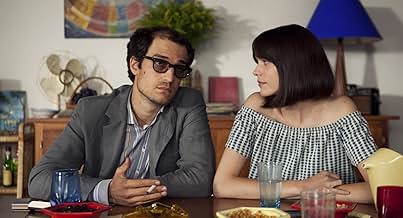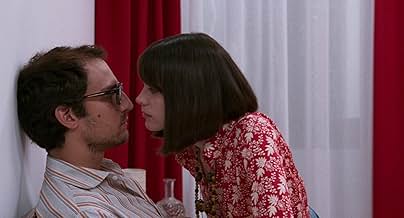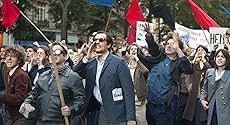CALIFICACIÓN DE IMDb
6.6/10
6.2 k
TU CALIFICACIÓN
Durante la realización de una de sus películas, el director de cine francés Jean-Luc Godard se enamora de la actriz de 17 años Anne Wiazemsky y más tarde se casa con ella.Durante la realización de una de sus películas, el director de cine francés Jean-Luc Godard se enamora de la actriz de 17 años Anne Wiazemsky y más tarde se casa con ella.Durante la realización de una de sus películas, el director de cine francés Jean-Luc Godard se enamora de la actriz de 17 años Anne Wiazemsky y más tarde se casa con ella.
- Dirección
- Guionistas
- Elenco
- Premios
- 10 nominaciones en total
- Dirección
- Guionistas
- Todo el elenco y el equipo
- Producción, taquilla y más en IMDbPro
Opiniones destacadas
Non-admirers of Jean-Luc Godard probably won't be bothering to watch this film in the first place, but I'm sure they'd be reasonably satisfied with the hatchet job that author Anne Wiazemsky and director Michel Hazanavicius have done on Godard, since even most of his admirers as a filmmaker and political guru probably already had a pretty bleak estimation of him as a human being.
Being based on a 2015 memoir by Godard's long estranged ex-wife, the late Anne Wiazemsky (1947-2017), the film is inevitably going to be as much about her as him, and its depiction of him even more inevitably from her jaundiced viewpoint. This also unfortunately means that the film concentrates on their time together between their marriage in 1967 and their separation in 1970, when both his gifts as a filmmaker and passion for cinema had recently curdled; although there was still enough of the film nerd in him to claim with a straight face (in probably the film's best scene) the legacy of Jerry Lewis more worthwhile than that of Jean Renoir. (I wonder how Godard took the news - if it ever reached him - of Lewis's later enthusiasm for Reagan and Trump.)
During his previous marriage to Anna Karina he was probably just as difficult a husband but hadn't become the politically doctrinaire bore and boor that Wiazemsky had to deal with (she portrays him as self-centred and neglectful rather than abusive). Godard's admirers at the time and since have tended to excuse the calamitous decline in the quality of his films after 1965 as politically justified, since they saw the unwatchable screeds he was now churning out as the legitimate expression of his commitment to "make films politically" by no longer making them entertaining rather than because he'd simply lost it.
Louis Garrel gives an energetic performance in the lead, but is too tall and good looking (he actually looks more like Jean-Pierre Léaud), fails to capture the nasal voice familiar from Godard's own films, his perennial 5 o'clock shadow has become designer stubble and then a full beard by the time the film ends; and he just isn't as weird and inscrutable as the man himself remains to this day.
Hazanavicius throughout lovingly recreates the look of Godard's early 60's films when he was in his prime, but treats him more as a comical figure like Woody Allen, complete with the running joke lifted from 'Take the Money and Run' in which his glasses keep getting broken and the admirer who like those in 'Stardust Memories' wishes he'd make another "funny film". (Not that Godard's pre-1968 films were all light-hearted bon-bons by any stretch of the imagination. 'Le Petit Soldat' and 'Les Carabiniers', anyone?)
Being based on a 2015 memoir by Godard's long estranged ex-wife, the late Anne Wiazemsky (1947-2017), the film is inevitably going to be as much about her as him, and its depiction of him even more inevitably from her jaundiced viewpoint. This also unfortunately means that the film concentrates on their time together between their marriage in 1967 and their separation in 1970, when both his gifts as a filmmaker and passion for cinema had recently curdled; although there was still enough of the film nerd in him to claim with a straight face (in probably the film's best scene) the legacy of Jerry Lewis more worthwhile than that of Jean Renoir. (I wonder how Godard took the news - if it ever reached him - of Lewis's later enthusiasm for Reagan and Trump.)
During his previous marriage to Anna Karina he was probably just as difficult a husband but hadn't become the politically doctrinaire bore and boor that Wiazemsky had to deal with (she portrays him as self-centred and neglectful rather than abusive). Godard's admirers at the time and since have tended to excuse the calamitous decline in the quality of his films after 1965 as politically justified, since they saw the unwatchable screeds he was now churning out as the legitimate expression of his commitment to "make films politically" by no longer making them entertaining rather than because he'd simply lost it.
Louis Garrel gives an energetic performance in the lead, but is too tall and good looking (he actually looks more like Jean-Pierre Léaud), fails to capture the nasal voice familiar from Godard's own films, his perennial 5 o'clock shadow has become designer stubble and then a full beard by the time the film ends; and he just isn't as weird and inscrutable as the man himself remains to this day.
Hazanavicius throughout lovingly recreates the look of Godard's early 60's films when he was in his prime, but treats him more as a comical figure like Woody Allen, complete with the running joke lifted from 'Take the Money and Run' in which his glasses keep getting broken and the admirer who like those in 'Stardust Memories' wishes he'd make another "funny film". (Not that Godard's pre-1968 films were all light-hearted bon-bons by any stretch of the imagination. 'Le Petit Soldat' and 'Les Carabiniers', anyone?)
It is such a pity that it was not enough for the director to talk about Godard, he also tried to make a film in Godard's style. In my opinion, he was not able to capture the "Godard mood" at all. Instead, the film is executed in a textbook manner, meticulously using Godard's cinematic language like a receipt and that's always a risky move (for example, Gus Van Sant's case with Psycho). Godard is Godard not for using these elements, but because he used them at the right time and in the right way. If this would have been done by breaking new grounds in cinematic language, or even without breaking the mould in such a way BUT finding the right tone, I would have liked the film much more. Godard's world has a sexy, humorous yet tragic atmosphere, where the viewer feels for the characters. To be honest, when watching a Godard movie, I'm always terribly envious that I was not born at the time of Belmondo. Here, I did not feel this longing, sadly. Having said that, the actors are cute and the director seems to be cool and all, judging from interviews, so it may be that I'm just too sentimental. :)
First, I can't think of any other film that treats the life of a director, except for Greenaway's Eisenstein In Guanajuato, and the far better known Chaplin. To have his life immortalized this way, a director would have to be a really fascinating person, and I doubt Godard is.
Second, we see how terribly self-absorbed he is throughout. He seems not to care for any of the people around him. The scene in the restaurant when he insults the old man and his wife should have ended in a fist fight, but cooler heads prevailed. Anne wants to make a film with Marco Ferreri--it will be her eleventh--but Godard objects violently: there's too much nudity. This is his wife who will be seen naked, and he forces Ferreri to shoot her with clothes on. Louis Garrel is especially fine in this scene, while Stacy Martin turns in a performance of some skill which makes me forget about the awful film she did with von Trier.
The best for last: about one hour into the story, we get Godard, Anne, the Bambans, Michel Cournot and the driver packed into a car headed to Paris (they'd have gone by train, but for the general strike). Cournot is down because his first and only film hasn't been shown at Cannes, Godard throws some gratuitous insults at him, and the Bambans join in. It's the ultimate bad car trip.
Second, we see how terribly self-absorbed he is throughout. He seems not to care for any of the people around him. The scene in the restaurant when he insults the old man and his wife should have ended in a fist fight, but cooler heads prevailed. Anne wants to make a film with Marco Ferreri--it will be her eleventh--but Godard objects violently: there's too much nudity. This is his wife who will be seen naked, and he forces Ferreri to shoot her with clothes on. Louis Garrel is especially fine in this scene, while Stacy Martin turns in a performance of some skill which makes me forget about the awful film she did with von Trier.
The best for last: about one hour into the story, we get Godard, Anne, the Bambans, Michel Cournot and the driver packed into a car headed to Paris (they'd have gone by train, but for the general strike). Cournot is down because his first and only film hasn't been shown at Cannes, Godard throws some gratuitous insults at him, and the Bambans join in. It's the ultimate bad car trip.
This bizarre mélange of genres--documentary, comedy, tell-all from a former lover--views above all like a hit job. This is the second film I encountered this week which focuses on a disgruntled former girlfriend´s unhappiness that her extraordinary lover turned out not to be entirely normal. (The other one was Mad to be Normal, about Scottish psychiatrist R.D. Laing). I find this sort of depiction of Godard, on the one hand, and R. D. Laing, on the other, to be disagreeable in the extreme. I have no difficulty believing that men with big personalities and egos are difficult to have relationships with. But to make an entire film about what a cad ¨the cad¨ is alleged to be (by a former lover) strikes me as an unvarnished act of revenge. Nietzsche (and probably Godard, since he has always liked Nietzsche) would surely identify in this production a consummate expression of ¨ressentiment¨.
It seems to me that there is something rather puerile about falling in love with someone who is an artist (touted by many as a creative genius) and then expecting him to suddenly be the average-joe husband and dad (in the case of R.D. Laing). How could that possibly turn out to be the case? It´s a package deal. You get the extraordinarily wonderful with the extraordinarily difficult to live with. Needless to say, I do not think well of the female protagonist here, who seems to have wanted to profit from what she viewed as her victimhood. Ugh.
I also found confusing that the director tried to imitate Godard´s style--part of the time, but not all of the time--while also trashing him. A confusing and unsatisfying creation, in my opinion. The comedic elements pretty much disappeared by the end, when all that remains is the whiny girlfriend and what is depicted as Godard´s descent into Maoist Marxism.
Godard haters will love this thrashing.
It seems to me that there is something rather puerile about falling in love with someone who is an artist (touted by many as a creative genius) and then expecting him to suddenly be the average-joe husband and dad (in the case of R.D. Laing). How could that possibly turn out to be the case? It´s a package deal. You get the extraordinarily wonderful with the extraordinarily difficult to live with. Needless to say, I do not think well of the female protagonist here, who seems to have wanted to profit from what she viewed as her victimhood. Ugh.
I also found confusing that the director tried to imitate Godard´s style--part of the time, but not all of the time--while also trashing him. A confusing and unsatisfying creation, in my opinion. The comedic elements pretty much disappeared by the end, when all that remains is the whiny girlfriend and what is depicted as Godard´s descent into Maoist Marxism.
Godard haters will love this thrashing.
Godard is not the sort of typical subject for a film. To say he lacks empathy, that he assaults the cosy preconceptions of much cinema and its audiences, is well-known.
At the time of this film he was undergoing a transition: he renounced his break-through films, he was intensely political in that celebrity French style which is often more pose and belles-lettres, than real accomplishment, a fact made clear in this film.
To present him in that anodyne fashion which Hollywood does, which is essential deceitful, as say "A Beautiful Mind" and many other movies, would be truly dishonest but fortunately this film does not do that. It is quite a good presentation of that period, both socially-politically and personally.
The film's style naturally, almost logically, had to be á la Godard, in some way, and it works without being pastiche. At times it pushes a little far but mostly enough to give that sense of how Godard's films looked at that time and before.
This is especially true of the interiors, a favorite setting and device of Godard's in the 1960s, where he had couples discuss and debate as they moved about apartments. Here the famous sequence in "Contempt" when Piccoli and Bardot's marriage ended is almost reprised as Godard and Wiazemsky's relationship shatters. The inspirational touch in this film was to add Richard Strauss's luscious but fatalistic song, Im Abendrot (At Sunset), over this sequence.
The performances are all done well. A little more lisp from Garrel's Godard perhaps, but really, technically and the overall production, the whole movie looks just right.
Well worth the time and a reminder that once films, and cinema generally, actually mattered socially and politically.
At the time of this film he was undergoing a transition: he renounced his break-through films, he was intensely political in that celebrity French style which is often more pose and belles-lettres, than real accomplishment, a fact made clear in this film.
To present him in that anodyne fashion which Hollywood does, which is essential deceitful, as say "A Beautiful Mind" and many other movies, would be truly dishonest but fortunately this film does not do that. It is quite a good presentation of that period, both socially-politically and personally.
The film's style naturally, almost logically, had to be á la Godard, in some way, and it works without being pastiche. At times it pushes a little far but mostly enough to give that sense of how Godard's films looked at that time and before.
This is especially true of the interiors, a favorite setting and device of Godard's in the 1960s, where he had couples discuss and debate as they moved about apartments. Here the famous sequence in "Contempt" when Piccoli and Bardot's marriage ended is almost reprised as Godard and Wiazemsky's relationship shatters. The inspirational touch in this film was to add Richard Strauss's luscious but fatalistic song, Im Abendrot (At Sunset), over this sequence.
The performances are all done well. A little more lisp from Garrel's Godard perhaps, but really, technically and the overall production, the whole movie looks just right.
Well worth the time and a reminder that once films, and cinema generally, actually mattered socially and politically.
¿Sabías que…?
- TriviaJean-Luc Godard himself called the movie a "stupid, stupid idea". The creators of the film then put this quote on the poster in very large font.
- Citas
Jean-Luc Godard: Politics is like shoes. There's a left and a right, but eventually you will want to go barefoot.
- ConexionesFeatured in Filmmelier Drops: O formidável Godard, o cinema e a política (2018)
- Bandas sonorasAdagio from Piano Sonata No.12 in F, K.332
Written by Wolfgang Amadeus Mozart
Performed by Maria João Pires
Selecciones populares
Inicia sesión para calificar y agrega a la lista de videos para obtener recomendaciones personalizadas
- How long is Godard Mon Amour?Con tecnología de Alexa
Detalles
- Fecha de lanzamiento
- Países de origen
- Sitio oficial
- Idiomas
- También se conoce como
- Godard Mon Amour
- Locaciones de filmación
- París, Francia(scenes in Paris in 1967 and 1968)
- Productoras
- Ver más créditos de la compañía en IMDbPro
Taquilla
- Presupuesto
- EUR 11,110,000 (estimado)
- Total en EE. UU. y Canadá
- USD 82,264
- Fin de semana de estreno en EE. UU. y Canadá
- USD 10,994
- 22 abr 2018
- Total a nivel mundial
- USD 1,332,204
- Tiempo de ejecución
- 1h 47min(107 min)
- Color
- Relación de aspecto
- 1.85 : 1
Contribuir a esta página
Sugiere una edición o agrega el contenido que falta

































